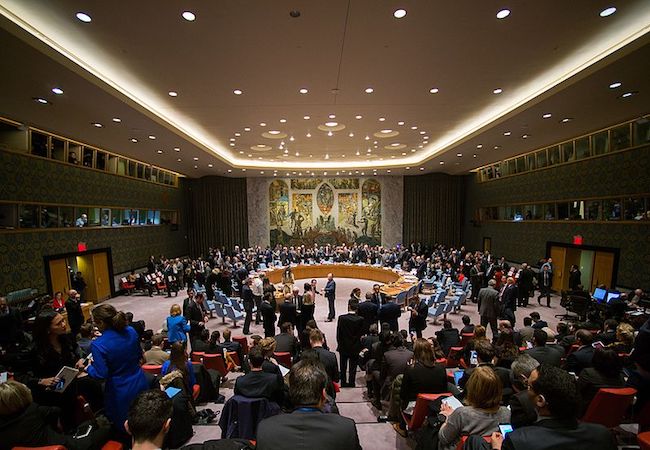New Versailles for the Middle East

For nearly two years, the international community has been like a remote bystander observing the situation in the greater Gulf region rolling toward a catastrophe, much worse than the conflicts in Syria and Iraq combined. Those conflicts in Iraq and Syria have already caused a big influx of refugees and migrants to Europe, which consequently gave rise to right wing, Nazi-like parties on the continent, which faced two deadly global wars in the last century. Though recently the situation seems relaxed in the Gulf but the hardline rhetoric still prevails among the conflicting parties.
The Middle East, besides old wounds, some of which were specifically caused by the geopolitical shift after World Wars I and II, has even more ancient problems, emanating from the religious divide among Muslim followers. In the early days of Islamic proliferation, two camps clashed over the succession of the leadership of the Islamic ummah (community): one was known as Sunni (“traditions” in Arabic) and the other as Shia (“party”). Over the centuries, religious division, also inherent to Christianity (Catholic, Protestant, and Orthodox), assumed an ethno-cultural dimension. From the 16th century onward, Shia Islam was concentrated in Iran and the surrounding areas, which was ruled by the Turkic-origin Safavid dynasty. However, its spread was halted and confined by the Sunni Ottomans, and since then, all attempts to expand westward were unsuccessful, despite the fact that significant portions of the Syrian and Lebanese populations remain Shia. Nevertheless, the expansion of Shia Islam became a central element of Tehran’s foreign policy. Similarly, once Saudi Arabia, the host of sacred Islamic sites, became independent in the post-Ottoman period, the spread of Sunni Islam also became an important messianic task. Despite enormous efforts and resources, neither power center in the Middle East could significantly expand their sphere of influence.
The civil war in Yemen, which caused a humanitarian disaster in the region, is a vivid example of an irrational proxy war with no end by military means. It is obvious enough that two main branches of Islam will not able to win over each over, just like Christian denominations—their century-old struggle continues, but there is a sign that Catholics and Protestants come to certain terms of coexistence. In fact, this intercommunal struggle appalls many people and makes them abandon any religious affiliation in favor of a secular lifestyle. Worse, in the Middle East, the century-old relatively peaceful coexistence of Muslims and Christians is threatened by East–West antagonism aggravated by unilateral American actions. It is widely perceived in the Middle East that the US acts in the region due to narrow interests—whether it is oil or any other US-related narrative is employed by radical clerics due to the absence of the rule of law in the region and the ignorance of international law on the part of global actors.
Against this background, the global powers, involved in the conflicts in Iraq and Syria, also launched proxy wars, which was a sort of success for the US in Iraq and for Russia in Syria. However, the “success” should indeed be put in quotation marks, as the situation worsened after the relative stability. Iraq, after the US invasion in 2003, was heading toward stabilization, but the emergence of ISIS in 2014 completely changed the security situation in a vast area of the Middle East and North Africa. ISIS in Syria managed to recruit followers from Russia to Europe. All this demonstrates the impact that the conflicts in the Middle East have on a global scale.
Israel’s decade-long conflict with Palestine and failed negotiations make some believe that the resolution process should be abandoned in favor of “business-as-usual” mode, which will not provide long-term resolution of Israel’s vital security concerns or eliminate the Palestinian aspiration for statehood.
Untying all these knots is a gargantuan task, which today puts many experts in a pessimistic mood. However, we might face an even bigger and worse crisis. On the threshold of the First World War, powers were competing for global dominance, making alliances to strengthen their security. Eventually, a “proxy event” in Sarajevo, where a Serbian revolutionary killed Austrian Archduke Franz Ferdinand, heir of the Viennese throne, caused the global disaster.
In 2016, Canadian historian Margaret MacMillan, who has extensively studied the history of World War I and argued that the war was avoidable, wrote of many unpleasant parallels with the situation in the 21st century—patient nationalism, rapid technological change, strained social relations, and imperial competition.
This year marked the centennial anniversary of the Versailles Peace Treaty—imperfect, especially in terms of the arrangement for the Middle East, yet it was an attempt to create a global security system. It failed and remerged after World War II. The United Nations exists now, but global and regional powers, blinded by ambitions, seem to have no appetite for a global conference for peace in the Middle East.
Time is critical, and only history will be able to test whether we have learned something from history.







